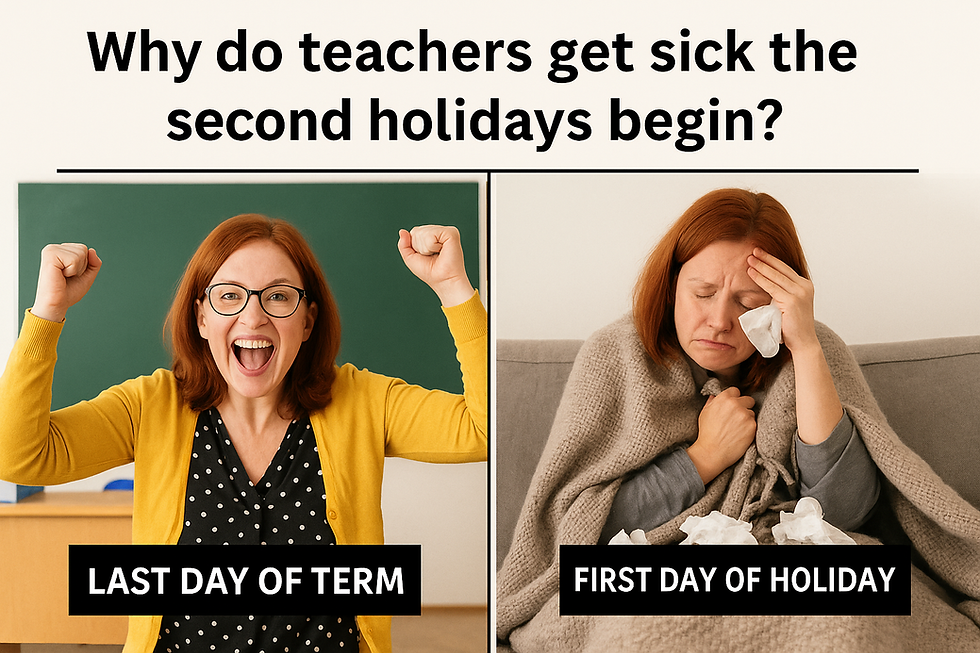Summer’s Here… and So Are the Coughs and Colds.
- karen@humanedgeperformance

- Jul 22, 2025
- 3 min read

It’s that time of year again, when teachers and leaders emerge from the depths of school life and reconnect with family and friends they haven’t seen since… well, probably the last break.
After decades in education, some of my closest friendships are with people who work in schools. And it’s during the breaks that we look forward to meeting up. But inevitably, there’s always at least one or two people who come down with a virus the moment the last bell rings. Often, that person was me. When I worked in schools, I used to think I was just ‘unlucky’.
However, I have since learned there’s actually a name for this sickness that turns up as soon as the term ends: leisure sickness. This is a physiological response to sustained pressure lifting. Apparently, when you’ve been running on adrenaline for weeks (or months), your immune system just throws in the towel the moment the last deadline is met.
📚 Research shows:
🔹 1 in 5 people feel physically unwell when holidays begin, especially in high-stress jobs like teaching (IU International University, 2024)
🔹 Stress suppresses the immune system, so unwellness symptoms emerge when pressure lifts (Segerstrom & Miller, 2004)
🔹 While wellbeing improves during holidays, the benefits fade within a week of returning to work (de Bloom et al., 2010)
🔹 What causes this? Because the term ends at full speed and starts again in a sprint, there is no buffer to decompress (Vingerhoets & van Heck, 2007)
Consequently, what we often see is that even after a break, staff return still feeling tired and fatigued. For some, that might be down to late nights and partying! But for most of us, it’s not.
Clearly, it’s not ideal when staff come back not feeling as rested or recharged as we’d hoped, especially with a term ahead that will, somehow, be even more manic and chaotic than the last.
And while it’s too late for leaders to address these effects for this summer holiday, there’s still time to plan ahead for what comes next.
💡 So what can leaders do now to help staff be in a better position to rest and recharge by the time the next break comes around?
✅ Rethink the September start. Holding off on monitoring, big decisions, and major initiatives in the early weeks allows staff to reconnect, regain rhythm, and ease back into the pace of school life. A gentler return helps set the tone for a more sustainable term.
✅ Protect energy and pace the workload by avoiding last-minute changes. Build in brief pauses between meetings.
✅ Give staff more control over how they plan, teach, and manage their work. These are shifts that support both wellbeing and motivation.
✅ Boundaries start with leadership. This means setting clear expectations around things like when emails are sent or responded to, being mindful of the language used, such as avoiding phrases like “We just need to get through this term.” When leaders take breaks, protect their time, and show that boundaries are acceptable it gives staff permission to do the same.
🌟If you want to reduce staff sickness over the holidays and support a more rested, recharged return to school, I’d love to help you build a healthier, more sustainable approach to wellbeing.
🌿 Hi, I’m Karen. I help school leaders tackle the root causes of staff stress and strengthen well-being to build healthier, high-performing schools.
My work is research-based, pragmatic and co-created with staff because real progress happens when we build on what’s working, understand what’s not, and create better ways forward together.
📚 Curious about the research behind this? Here’s where the insights came from
de Bloom, J., Geurts, S. A. E., Taris, T. W., Sonnentag, S., de Weerth, C., & Kompier, M. A. J. (2010). Effects of vacation from work on health and well-being: Lots of fun, quickly gone. Work & Stress, 24(2), 196–216. https://doi.org/10.1080/02678373.2010.493385
Segerstrom, S. C., & Miller, G. E. (2004). Psychological Stress and the Human Immune System: A Meta-Analytic Study of 30 Years of Inquiry. Psychological Bulletin, 130(4), 601–630. https://doi.org/10.1037/0033-2909.130.4.601
Heck, van, & Ad Vingerhoets. (2007). Leisure Sickness: A Biopsychosocial Perspective. Psihologijske Teme, 16(2). https://www.researchgate.net/publication/26571455_Leisure_Sickness_A_Biopsychosocial_Perspective
IU Internationale Hochschule. (2025, June 24). IU study about leisure sickness | IU News. https://www.iu.de/news/en/leisure-sickness-one-in-five-feels-ill-or-exhausted-on-holiday/




Comments